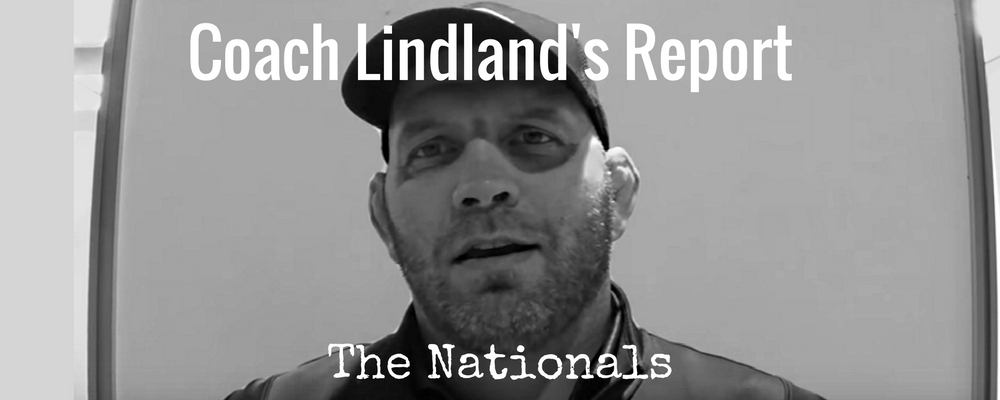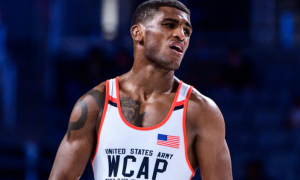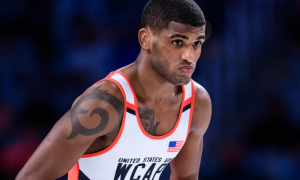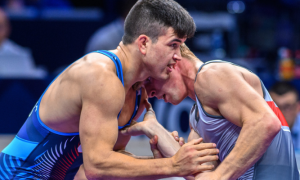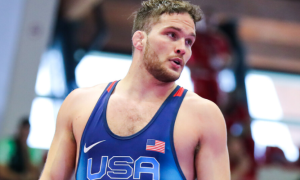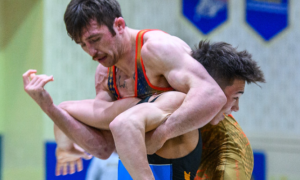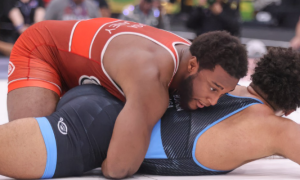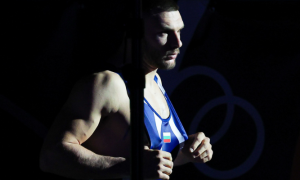Five Point Move is proud to host US Greco Roman National Team Head Coach Matt Lindland every week for “Coach Lindland’s Report.” For fans and wrestlers looking for insights regarding the US Greco National Team, we ask Coach Lindland some questions to get his take on training and upcoming competitions. If you have any questions you’d like us to ask going forward let us know via Facebook, Twitter, or through our Contact page.
This week, we talk to Coach Matt Lindland soon after he arrived home from Budapest, Hungary, which was part of a three-week stretch that began with the Golden Grand Prix in Baku, Azerbaijan. From there it was the World Wrestling Clubs Cup and then finally, the World Championships this past weekend. The rule change is front and center in our discussion, with Lindland having come off three high-profile international events. The performances of both Chris Gonzalez and Patrick Martinez are also highlighted. The conversation then switches to the January camp at the OTC and what its overall theme will be. Of course, this weekend’s Nationals along with the scheduling of the event is brought up, as well.
5PM: You just got to witness three major international events over the last few weeks, which means you saw the new rules in effect on a grander scale than what happened in New York. What is your overall impression of no more forced par terre coming out of this trip?
Coach Matt Lindland: You know that I love par terre and I am a huge fan of it. My opinion is definitely changing as I see these new rules. I saw the Juniors competing with these rules and they are the athletes who are definitely capable of scoring. We are seeing younger athletes going in there and doing arm throws, head throws, and bodylocks. They are scoring nice points. We saw that match Tracy (Hancock) had against the Georgian in the first period (at the Junior Worlds), they already had about 17 points on the board. We know that the younger athletes are capable of scoring with these rules.
Unfortunately, what we’re seeing is the guys who have been wrestling with forced par terre are not going out and executing. They aren’t taking risks and taking chances to score more points. Frankly, right now at this time in the quad, it shouldn’t matter who wins. It should matter who is scoring points because the sport needs to win right now. The sport of Greco Roman needs to win. Everybody wants to see the exciting parts of the sport, they don’t want to see the constant fighting for position. Honestly, we don’t have time to push for passivities. We’ve got to go in there and attack because there are no opportunities to get on top anymore. We have to change our philosophy.
One of the problems is that maybe, some of the guys wrestling now don’t know how to score points on the feet. They are very defensive, good pummelers, and they have just been waiting for par terre. Really, it’s up to the coaches and the athletes to push our sport to the next level and the next generation, which is scoring on the feet.
5PM: When the rule change was announced, virtually to a man the US athletes were pleased because the prevailing feeling was that on the feet is where they are strongest. But so far, we’re not seeing a bevy of points being scored and a lot of chances being taken. What do you attribute that to?
ML: Well first of all, we’re talking about competing with guys at the highest level. You’re wrestling some of the best guys in the world. And we’re also wrestling guys who are defensive wrestlers. They are good at not giving up points right now. They are not so good at potentially scoring either, so they aren’t taking risks or opening up. We have to create opportunities, we have to force positions, and we have to challenge these guys and get out ahead of them. We have to be the ones who are scoring early. These rules are going to stay whether we like it or not. And this is what the IOC needs to see, people scoring on their feet. If we want to elevate our sport to the next level and get on television, throws are essential. We have to have guys who know how to execute good throws.
But what I did see was our younger athletes executing. I saw Hancock and Kamal Bey, who wrestled in Senior level events Thursday and Friday, and they were actually executing scoring techniques. I mean, we saw bodylocks, we saw big head throws and guys going for four and five-point throws. But we didn’t see that out of our more veteran athletes, our older guys. Martinez didn’t score a lot of points in his match. Gonzalez, he was looking to win on passivity points and he got pushed out. These are guys who were training with the old set of rules.
We’re going to see a lot of younger athletes coming in and being able to execute. And I’m not talking about the US, I’m talking worldwide. The athletes who are out there right now and don’t execute, they are going to be replaced with athletes who do. I think that is just going to happen on its own. It’s going to happen because there are coaches out there who are pushing their athletes to execute techniques and score on their feet.
5PM: What are some of the adjustments that are needed to be made? Is it in the practice room with technique and approach? Mental coaching or encouragement to be more aggressive with the new rule-set?
ML: I think that first and foremost, you have to talk about fundamentals and positioning. We have to be able to put our bodies in the right positions before we execute anything. Before the execution comes we’ve got to focus on positioning. But once we get into position though, we can’t hesitate. We have to execute when we feel the opportunity arise. We can’t adjust and fix position, we have to GO. And right now, someone like Cheney Haight, who has an incredible bodylock, at the Grand Prix he locked up, made an adjustment, and the guy stepped in and threw him. He got back on his feet, got in there, same position, tried to make an adjustment, the guy stepped in and threw him. I don’t even know if the guy had time to lock his hands, he may have just wrapped his body. But the guys who are scoring aren’t waiting, they’re not making adjustments or fixing their position. They are already in position and when they execute, they go. They do not hesitate.
What’s it going to take in practice? First of all, it’s the amount of time you spend on your feet versus the amount of time on par terre. I think under the old rules, you were probably closer to 50/50 really in regards to how much time you spend on your feet versus how much time you spend on par terre offense and defense. I think par terre could still be a part of this sport if you take a guy down, and we saw that. One of Hancock’s matches where he got thrown for four, lifted for four, and the match was over in under a minute. This was right after he beat an Olympic medalist. But that young athlete didn’t hesitate, either. Once he took him down he scored in the par terre. I saw matches where we gave up points on our feet and we were so concerned over what happened, that we weren’t in the present and focusing on how we’re going to defend right now because we’re still in par terre. We have got to be able to make that adjustment mentally.
So you’re asking me, Is it mental, is it physical, is it technique? It’s all of those. If you get taken down, you have to be presently in the moment of what you have to do. You have to be in the moment, you have to move, you have to put pressure on the lock, you have to stop him from turning you. And then you can worry about what happened when you get back on your feet. But if you’re worried about what just happened because you got taken down for four points and you’re thinking about what you’re going to do on your feet, if you’re worried about either one of those things, you’re focused on what happened and not what you have to do right now on the mat. You’re not mentally in the right spot. So yeah, we have to adjust the mental approach, the positional approach, and we have to execute the techniques.
5PM: This all culminated with the World Championships this weekend. You had first-timer Chris Gonzalez go at 71 and Patrick Martinez, who while in a way is still a neophyte, he’s certainly not when it comes to the Worlds, it was his second one. If you could, recap both athletes’ performances.
Coach Matt Lindland: I think that Martinez is definitely a capable athlete. I liked the draw, he had an opponent that we were very familiar with that he lost to a close match at last year’s World Championships. But the athlete hit a beautiful technique and took him down for four and the mental approach wasn’t there. I have to defend right now, and then later worry about what he’s got to do to get those four points back and then some. But you know, I think Patrick is still pretty young in a lot of aspects of the sport. He has put himself in a lot of positions, though. He has made World teams, he has gotten himself overseas to compete in some pretty major international events that he has had a lot of success in. So I know that he is physically capable. He has to make some mental adjustments that we are going to talk about moving forward because I want to see Patrick have the success I know he is capable of having.
As far as Chris, he did a great job. He won that first match when a lot of guys get shell-shocked for their first time at a major international event. He seemed to handle that okay. The second match was definitely a winnable match. He made a tactical error and stepped off the mat, giving up the point and that was the last point scored. If I’m recalling it correctly, there were under 30 seconds left. That is a simple adjustment in positioning and tactics. That is what I was talking about before, position.
That is our first priority, to have our athletes’ bodies in the right positions at all times. You don’t get pushed out when you are in the right position. Your ass is in the center, your weight is down, and you are using your legs, you are not getting backed up. If you get backed up, your body is maybe too elevated, maybe you’re too tall. Your back is certainly not in the center of the mat. Positional adjustments are right there for Chris. He literally just got out to Colorado a few weeks before he made the team. He made a big commitment to the program saying, I want to be in Colorado Springs in a training environment at the Olympic Training Center surrounded by the best athletes, coaches, and training partners I could find in the country.
I think we have a lot to work with there. He’s a very talented athlete and I think we can make some adjustments pretty quickly with Chris. And of course, I want to discuss some mental aspects with him, too, to make sure those weren’t mental errors.
5PM: Following the New Year you’re holding the January camp. Entering a new quad, what is going to be the general theme and what’s approach you are introducing?
ML: I think that’s a great question because I think starting a new quad with a new generation of athletes we have to create a culture here. First of all, you have to have to the right culture and then you have to have the right people fit into that culture, whatever that is. And then you have to build a theme around that. For me, I think you know that I am big into whitewater paddling. I love doing some whitewater racing, it is a sport that I had gotten really involved in and had a lot of fun, though I’ve put it on hold since I started this job. I have gotten to do a couple of recreational trips but I haven’t competed once since I’ve become the National Team coach.
There are a lot of lessons that I have learned in wrestling, martial arts, and then there were a lot of lessons I learned competing in my first team sport. Rafting is a team sport. You either compete with two athletes, four athletes, or six athletes. Just like wrestling though, you have a bunch of individuals who are competing on a team. Literally every athlete in that boat has his own paddle. It’s kind of the same thing with wrestling. You have a team and you have to get everybody in the boat and ironically enough, there are six spots in that boat. That is how many will be in the 2020 Olympics, there are six spots. When we race, we have what is called the “red boat.” The red boat was going to go out there and take on all of the other teams and beat them. I was in the red boat for six years and I won the regional championships six times. And the R2 division, the R4 division, and the R6 division. Whatever team I was apart of, I found a way to compete on the winning team. We had a white boat and a blue boat, as well. These were the other teams that were part of the Oregon Rafting Team, they were the JV boats or the super JV boats, or whatever you want to call that. That’s just competition. It’s not a negative connotation by any means, it’s just the guys who were serious about competition.
Now, there were some men on our team who were just recreational boaters and they were happy to be in the blue boat or the white boat because they were out there to have fun. But the guys in the red boat had to be pretty serious and we had to train. We had to prepare properly and make adjustments as a team. When you are in a boat, there are a lot of times where you have a current on one side of the river and on the other side of the boat is no current (laughs). One side of the boat is working hard and the other half is just keeping stride and staying in the rhythm and sequence so we get out of the current. And sometimes, it’s the other side of the boat that has the current.
So it’s a lot like our sport where maybe you have athletes who can coast right now because they are healing an injury or something, but they are still staying in sequence with the rest of the team. They are still paddling along with the boat. There are just so many different things I learned about this sport that I want to share with these athletes because I think the analogies are there. To me, the paddle is the action, the energy that propels the boat forward. Each individual has to have his own paddle or you don’t propel the boat in nay direction whatsoever. If one side of the boat is paddling harder than the other, you’re going to slip. We’ve done some exercises with our team where I have taken these guys up to a play park up in Pueblo (Colorado) and we paddled into the surf. It’s the equivalent to surfing in the ocean. You paddle your boat into the current and you hold into the wave. If one side of the boat stops paddling one stroke, the boat turns. And when the boat turns, the water catches that corner and people start flying out of the boat.
We’ve done that, so people on my team know what I’m talking when I say we have to work together and stay in stride. Because if one side of the boat isn’t working hard, we’re going out. We are having a shit show and guys have paddles flying out, they are floating down the river and honestly, I don’t want to see any of my athletes in the water. Because when you are out of the boat, a lot of dangerous things can happen in whitewater. You can get caught up in the stream, you can hit a rock and get stuck underneath and drown, you can catch hypothermia. There are so many elements of danger in the water so I don’t want any of our athletes out of the boat. I want them in a boat, whatever boat they are in, whether that’s the red boat, the white boat, or the blue boat. They are in that boat and paddling in the right direction.
I want to lay out that theme. We are going to be working on some mental skills, as well. We’re going to lay out our philosophy on how we have to score and we are going to talk about positions, and how we can create those opportunities to score by attacking our opponents off angles and not standing right in front of them. There is a lot of stuff to cover in the January camp. I’ll have athletes out here for two weeks and we’ll be able to present our philosophy and theme for the next quad, start to establish that culture, and get some great training in.
5PM: How soon into your whitewater rafting career did you see these parallels with wrestling?
ML: Honestly, like all of the time. Right away. I was really excited to compete in a team sport. As an athlete, I never competed in a team sport. I was an equestrian athlete as a youth. In high school I became a wrestler and then I competed in martial arts as a profession, so it’s always been an individual sport for me. Once I began competing with a team I started to understand team dynamics a lot more and started to see all of the parallels with being a wrestler. Because we are a team on a boat, we all have to pull our own weight and work together. But individually, you have to prepare yourself mentally and physically because you don’t have the team with you all the time. Yes, certainly, we get out there and practice whitewater together but there are also a lot of times when we are doing off-water training. You do not get in the red boat by doing the minimum.
5PM: The Nationals being held in December this year means there were three events back-to-back-to-back leading up. What is your take on the scheduling of the event and the role it plays with the coming year.
ML: First of all, we scheduled the Nationals in December so it could give us an opportunity to have our World Team Trials in April. The same time the men’s freestyle program is going to have their nationals, we are going to have our team selected. We will know who is in the boat this year and we’ll be able to prepare those athletes with enough time and knowing who they are, we’ll be able to work with them to get them prepared for the World Championships.
We did not know, however, that there was going to be a World Championships for the non-Olympic weights, so that kind of fell in. We were lucky to have the chance to take some athletes out there to compete at that tournament. That happened and you know, quite frankly, we’re not looking to peak right now. We are talking about development. If we focus on development, we are going to continue to get better. But if we are focusing on peaking for every event or peaking for the wrong events, we are potentially not going to have the best performance at the most important event, which is the World Championships. And I think with our schedule coming up we are going to have a great opportunity to have our Nationals, then our January camp, and we’ll get another tournament in with Schultz.
We will also be able to take our Juniors to some Junior tournaments and our Seniors on a winter tour. We are also going to combine some tournaments where Juniors will compete in some Senior-level tournaments like they did last week. We are really focused on a lot of these young guys right now and getting them prepared properly but at the end of the day, we want to have our best team this year for the World Championships. When we get back, we are going to have six weeks for our athletes to be able to peak for an important event, our World Team Trials in April. There is going to be a six-week period for them after their winter tours to train and peak for that event. Then we are going to come back and properly prepare for the World Championships after that team is selected.
5PM: The Nationals are still a marquee event domestically. What are you looking forward to about the event this weekend?
ML: You know, I have no expectations this weekend at the Nationals. What I would like to see are more athletes to build the depth in our program, guys who I haven’t seen who show up. I don’t know if that’s likely. I want to see if guys are scoring. I want to see if athletes are executing techniques, if their bodies are in the proper position to be able to execute techniques. I’ll be taking a lot of notes so we can put in the proper training at our January camp to make the proper adjustments.
5PM: One last question, the Olympic Channel produced a wonderful short video this week featuring you talking to your “younger self.” How did this come about? It’s worth asking since a lot of people seemed to really enjoy it. Maybe people don’t see that side of you all the time.
ML: I met some people from the Olympic Channel while we were in Baku and we had some of our athletes doing some fun stuff with them to show their personalities, and I think it’s incredible that the Olympic Channel is doing this, featuring Greco Roman wrestlers. I met with them, got to know them, and then when we were in Budapest, they asked me to come by one of the breaks in the sessions. I came by and they just asked me some questions. They wanted me to talk to my younger self (laughs). It was kind of an awkward interview, the nature of it. You are literally talking to yourself as if you were a younger person. It was an awkward conversation but I think it came out pretty well, to tell you the truth. But by other side of myself, what do you mean?
5PM: Well it’s not that you’re ornery or something. But you are so much about the athletes now, they are your focus, so it was interesting to see this sort of introspective spot. I didn’t know you were into Nirvana, for crying out loud.
Coach Matt Lindland: (Laughs) I grew up in the Northwest in the 80’s. Nirvana, Social Distortion. We lost an incredible artist. Well, that was fun. So, yeah (laughs). It was an interesting piece.

Notice: Trying to get property 'term_id' of non-object in /home/fivepointwp/webapps/fivepointwp/wp-content/themes/flex-mag/functions.php on line 999

